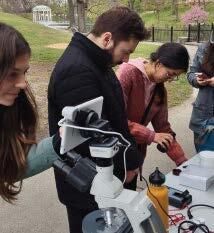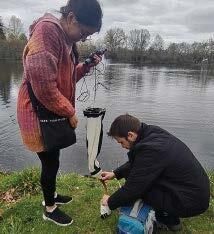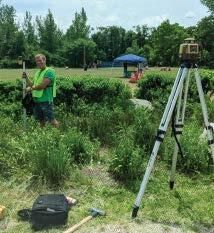Published December 19, 2022
Green Infrastructure Is Only Getting Better in Roger Williams Park
Restoration and Community Engagement are Key for Climate Resiliency
By Rebecca Reeves, Stormwater Education and Outreach Coordinator
Look for some new retrofits to be constructed on existing green infrastructure in Roger Williams Park next year. These restorations will improve the structures in place and allow them to work more efficiently – directing more stormwater, removing more pollutants, and keeping the ponds and lakes cleaner for the community.
Providence Stormwater Innovation Center (PSIC) received funding for these projects from Restore America’s Estuaries Southern New England Program Watershed Implementation Grant (SWIG). With over $1 million awarded each year, these grants help organizations to restore coastal and watershed ecosystems in cities and communities throughout Southeastern New England.
Along with these retrofits, the PSIC will offer a training session about potential issues that can arise during the design, construction, and maintenance of green infrastructure. Another portion of the grant funds will go toward engaging community volunteers statewide to monitor and record the performance of these structures during and after storm events using a web app. This web app will allow us to collect performance data for the owners of green infrastructure projects and to advise them of any potential retrofitting needs.
Part of PSIC’s mission is to relay to professionals, as well as the public, best practices within stormwater management. Our hope is that engaging the community in this work will build awareness and responsibility for stormwater management. While Rhode Islanders might notice green infrastructure projects, they are often unaware of how these structures help filter stormwater. We are also looking to educate members of the community in ways they can help at home, such as restricting use of fertilizers and refraining from pouring foreign materials down a storm drain. This project will help build a bridge between those who are more focused on the technical aspects of stormwater management and those who live in our urban Rhode Island communities and are most impacted by this work.
Improving the health of our watersheds is critical, particularly in urban environments. Our watersheds support native plant and animal life and provide food and habitat for numerous species, including native birds. With the funding from this grant, we hope to work with our many partners to increase the efficacy of our local stormwater systems and build public awareness about how stormwater management affects our ecosystems and the health of our communities.
Volunteers use a fluorometer and microscope to examine and measure cyanobacteria. A plankton net is used by volunteers to collect water quality samples. Audubon Stormwater Manager Ryan Kopp conducts an elevation survey within existing green infrastructure.




















